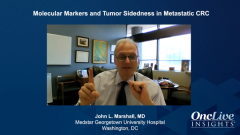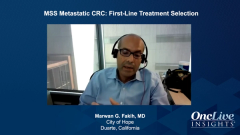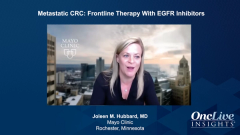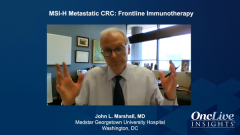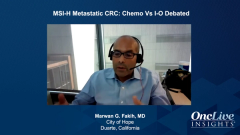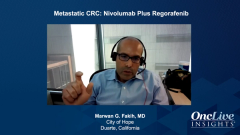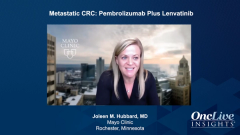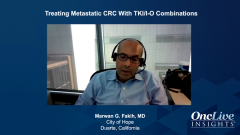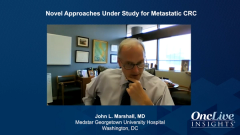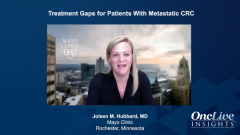
Novel Approaches Under Study for Metastatic CRC
John L. Marshall, MD; Marwan G. Fakih, MD; and Joleen M. Hubbard, MD, highlight novel strategies in the metastatic colorectal cancer pipeline that look exciting and consider their integration into future clinical practice.
Episodes in this series

John L. Marshall, MD: We were talking, before we went on about the combination of regorafenib and bevacizumab… I have said for a long time, since I was doing vaccine work almost 15 years ago, that we know that circulating VEGF suppress antigen presentation. It’s possible, for all of these years, that we think of bevacizumab as an anti-angiogenic that might not even be the on-target efficacy. It may be coming through some sort of immune-positive help. But, it’s taking us a while to come to this. But now you look at atezolizumab/bevacizumab in HCC [hepatocellular carcinoma]. Is that dual mechanism of action, or the synchronous mechanisms of action enhancing the immune response going forward? So with that, Joleen, this is the fun part where we get to think about what’s going to happen next. There are a couple of interesting studies that were presented adding I-O [immuno-oncology] with some of our more traditional colon cancer therapies, such as capecitabine/bevacizumab and panitumumab. Maybe you can talk us through that and describe your reflections with where we are?
Joleen M. Hubbard, MD: The first option you’re referring to is the combination of pembrolizumab plus capecitabine plus bevacizumab, and that was in pretreated MSS colorectal cancer. That was an interesting study. They had about 29 patients, and 2 of those patients had a partial response to capecitabine plus bevacizumab. When you look at the abstract, all of the patients were resistant to fluoropyrimidine or bevacizumab. So it’s hard to know whether or not pembrolizumab is really adding anything to that patient population. In prior studies where capecitabine/bevacizumab has been a comparator arm, we do see some responses, sometimes even in patients who are resistant. So I think I’ll wait for more data before I consider using that regimen for my patients. But they had enough signal to keep going with the study at their interim analysis, so hopefully we’ll have some more data on efficacy soon. But right now, I wouldn’t use that treatment outside of a clinical trial.
John L. Marshall, MD: I was disappointed with the nivolumab/ipilimumab and panitumumab, myself. I was thinking that it was a cool idea. The authors claimed victory, but I’m not sure I saw that in the data. What was your take on that?
Joleen M. Hubbard, MD: These patients hadn’t received an EGFR inhibitor before. They had received 1 to 2 prior lines of therapy. So actually, a response rate of 35% in that patient population was not surprising to me, just given the patient population. The median PFS [progression-free survival] was 5.7 months. For those patients who had only had 1 or 2 prior lines of therapy and no EGFR inhibitor beforehand, I actually thought that median PFS was disappointing. So again, interesting idea, but I think I need more data to confirm efficacy before I would use this combination.
John L. Marshall, MD: I couldn’t agree more.
We’re holding the responsibility for our patients of trying to make this a better place for them. What do you see in the future? What are you excited for within the next 5 years that might change things? Marwan first, and then Joleen.
Marwan G. Fakih, MD: I’m very optimistic about MSS, but in the right patient population. I really do think that the group of patients with nonliver metastases is a group we need to look at. I don’t think all those patients benefit. I think the high burden of disease is probably an area that is probably an area that is also more resistant to PD-1 targeting. I do predict that we’re going to hopefully, in 3 to 4 years, have some confirmation that PD-1 plus a TKI [tyrosine kinase inhibitor] is beneficial for our patients. I think particularly, patients with lung metastases appear to really benefit from that. I think the future, however, has to look at other areas, such as cellular therapeutics. We’ve seen some really exciting data with TILs [tumor-infiltrating lymphocytes] in melanoma. How do we make that work for our colorectal cancer patients?
Joleen M. Hubbard, MD: I’m really excited for the KRAS-mutant patient population. We’ve got a couple of promising KRAS inhibitors. Some of them are very specific—G12C, G12D. But there’s also onvansertib, a PLK1 inhibitor. There’s a study going on right now with FOLFIRI/bevacizumab plus onvansertib for KRAS-mutant patients. It’s interesting. They’re following circulating tumor DNA and they can see the KRAS mutation levels decrease over time with treatment, and that corresponds to response as well. So I’m really optimistic for that large chunk of patients. We may have some additional treatment options for this population.
John L. Marshall, MD: That’s great. I think this big data that we’re collecting, along with clinical outcomes, and using the help of our computer friends with artificial intelligence, will reveal novel patterns, novel targets, and actually make us more efficient as we get away from trial-and-error medicine. We will have much more informed medicine based on the data that we are all collecting.
You guys are really, really smart. Thank you so much for joining me. And let me thank, again, Dr Joleen Hubbard, from Mayo Clinic. It’s great to see you, great to talk with you. And Dr Marwan Fakih, from City of Hope. Thank you so much for sharing your insights to our audience today.
Transcript Edited for Clarity


